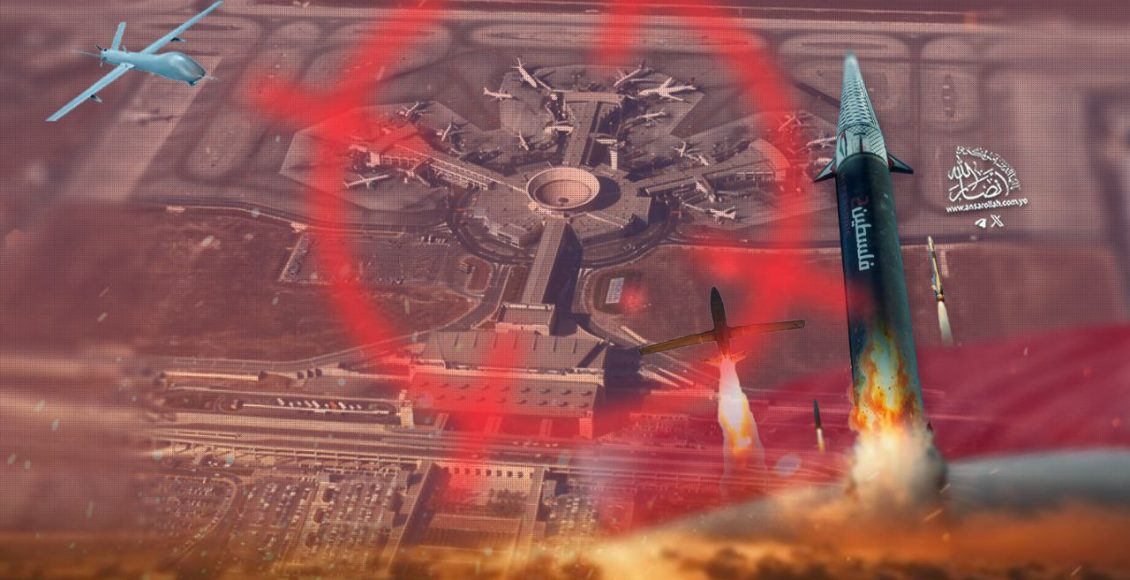The first week of battle has been a heavy blow for the American enemy in its failed war against Yemen. So far, it has reaped nothing but disappointment, losses, and regret.
At the onset of its aggression, the American attack relied on the aircraft carrier "USS Harry S. Truman", believing that it would achieve the desired results of its surprise assault on our country, which began on the 15th of Ramadan (March 15). However, the outcome has been nothing but failure. Now, Washington is sending a second aircraft carrier, further proving its defeat and incompetence.
Sayyid Abdul Malik Badruldeen al-Houthi affirmed this reality—may Allah protect him—when he stated in his 22nd Ramadan lecture:
"The American uses its aircraft carrier to intimidate others, but in its confrontation with Yemen, it has become a burden on the Americans themselves. Its presence in the sea has turned into a threat to those aboard, placing it in a weak and concerning position. That is why the Americans have now announced the deployment of another aircraft carrier—because the first one has failed. It has failed and is in a weak position. This is an admission of defeat."
Sayyid al-Houthi—may Allah protect him—continued:
"Sending another aircraft carrier is an acknowledgment of failure. It proves the Truman's failure, which was previously enough to threaten major powers like China. Now, the Americans themselves are admitting its failure."
From the very first moments of this renewed American aggression, U.S. President Trump adopted a tone of extreme threats, vowing to deliver a "devastating and lethal" strike against Yemen. He immediately began targeting civilians, bombing residential areas in Sana’a, Sa’ada, Hajjah, Al-Bayda, and multiple other provinces, believing that this would break the will of the Yemenis and force them to abandon their support for Gaza. However, the results have far exceeded his worst expectations.
The Yemeni Armed Forces responded forcefully, targeting the sources of enemy fire by launching ballistic and cruise missiles, as well as drones, at the Harry S. Truman. These powerful strikes forced the carrier into a defensive position, turning it from an aggressor into a vulnerable target. This situation has left both the Truman and its escort warships in a state of confusion and exhaustion. This explains why the Americans are now rushing to send another carrier in a desperate attempt to avoid heavy losses.
It is evident from the first week of this battle that the Yemeni Armed Forces possess the capability to strike the Truman—and potentially even sink it. However, their strategy is focused on wearing down the enemy, exhausting its resources, and spreading its forces thin. This approach prevents the Americans from escalating further and compels them to remain on the defensive. This calculated military tactic has yielded significant results, including limiting the operational capabilities of U.S. warplanes in Yemen and preventing further massacres against civilians. Additionally, it keeps the enemy in a constant state of fear, aware that the Yemeni Armed Forces could strike and sink the carrier at any moment—an event that would be a humiliating disaster for the United States.
Ben Gurion Airport Is No Longer Safe
While the Yemeni Armed Forces continue their direct battle against the U.S. Navy and achieve remarkable victories, they have not ceased their unwavering support for Gaza. Yemen has successfully adapted to this confrontation, engaging in direct warfare against both a global superpower and the Zionist enemy’s regional military force.
In its campaign against the Zionist entity, Yemen has maintained its naval blockade, preventing Israeli ships from passing through the Red Sea. However, the conflict has now entered a new phase of escalation. Yemen has launched hypersonic ballistic missiles at key Zionist military sites, including Nevatim Airbase, which serves as a launchpad for Israeli warplanes bombing Gaza and massacring Palestinian civilians. These attacks aim to disrupt enemy air operations against the besieged Strip.
The most significant escalation, however, has been Yemen’s decision to launch Palestine-2 hypersonic missiles at Ben Gurion Airport and warn airlines that the airport is no longer safe. This marks the imposition of an aerial siege on the Zionist entity—an extremely troubling development for the enemy. If the Zionist enemy cannot endure a maritime blockade, then an air blockade is an even greater nightmare.
Yemen’s success in enforcing an air siege—whether by fully shutting down Ben Gurion or even just halting air traffic daily—will place immense pressure on the Zionist regime. This will serve as a powerful tool in supporting the Palestinian resistance in Gaza, forcing the criminal Netanyahu to concede to the resistance’s demands. The only alternative would be for Netanyahu to continue down a reckless path alongside Trump—an option that is unlikely to be in their favor.
The reality is that Yemen would not announce an air blockade on the Zionist regime unless it was certain of its ability to enforce it. This is not a bluff—it is a serious and decisive action. The world has already witnessed Yemen’s success in the naval battle, and there is no reason to doubt its capabilities in the aerial battle. Airlines will take Yemen’s threats seriously; they will not risk flying to "Tel Aviv".
Ben Gurion Airport is one of the most critical hubs for the Zionist entity and its economy. Shutting it down would deal a severe and devastating blow to the occupation regime—and to its main sponsor, Washington.







